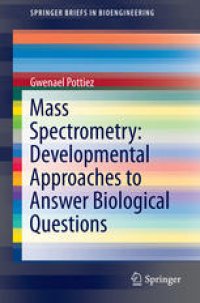
Ebook: Mass Spectrometry: Developmental Approaches to Answer Biological Questions
Author: Gwenael Pottiez (auth.)
- Tags: Spectroscopy/Spectrometry, Biochemical Engineering, Biomedicine general
- Series: SpringerBriefs in Bioengineering
- Year: 2015
- Publisher: Springer International Publishing
- Edition: 1
- Language: English
- pdf
The understanding of the events taking place in a cell, a biological fluid or in any biological system is the main goal of biology research. Many fields of research use different technology to assess those events. Mass spectrometry is one of those techniques and this undergoes constant evolution and adaptation to always enhance the accuracy of the information provided. Proteomics provides a large panel of data on protein identity and protein expression that were made possible by mass spectrometry. For several years now mass spectrometry has become central to performing proteomic research, however this powerful tool is under constant evolution to be more sensitive and more resolute. More importantly mass spectrometry became a field of research focusing on new applications. Indeed, the complexity in biological systems relies on the changes of expression of transcription of proteins but also on the post-translational modification of proteins, the structure of proteins and the interaction between proteins, amongst others. As of now, several investigations tried to improve the quantification of proteins by mass spectrometry, the determination of post-translational modifications, the protein-protein and protein-nucleic acids interaction or the proteins structures.
This book is structured as follows: after a brief introduction of the usual and most popular applications for mass spectrometry in proteomics, the most recent research and developments in mass spectrometry-based methodologies will be explored.
The understanding of the events taking place in a cell, a biological fluid or in any biological system is the main goal of biology research. Many fields of research use different technology to assess those events. Mass spectrometry is one of those techniques and this undergoes constant evolution and adaptation to always enhance the accuracy of the information provided. Proteomics provides a large panel of data on protein identity and protein expression that were made possible by mass spectrometry. For several years now mass spectrometry has become central to performing proteomic research, however this powerful tool is under constant evolution to be more sensitive and more resolute. More importantly mass spectrometry became a field of research focusing on new applications. Indeed, the complexity in biological systems relies on the changes of expression of transcription of proteins but also on the post-translational modification of proteins, the structure of proteins and the interaction between proteins, amongst others. As of now, several investigations tried to improve the quantification of proteins by mass spectrometry, the determination of post-translational modifications, the protein-protein and protein-nucleic acids interaction or the proteins structures.
This book is structured as follows: after a brief introduction of the usual and most popular applications for mass spectrometry in proteomics, the most recent research and developments in mass spectrometry-based methodologies will be explored.